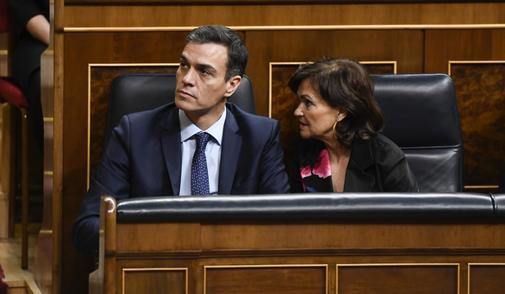The report of the Royal Spanish Academy (RAE) on the adequacy of the language of the Spanish Constitution will be sent exclusively to Vice President Carmen Calvo and not to the whole of Spanish society, as EL MUNDO has learned. It will be Calvo, author of the commission , who will publicize the text or keep in a drawer a job that can be summed up very simply: there is no linguistic reason to reform the magna Carta.
Something of context: in July 2018, when the PSOE had just arrived at the Government, Calvo appeared before the Parliamentary Equality Commission and announced that he would entrust the RAE with an expert opinion on the allegedly macho language of the Constitution and on the possibility of reforming its writing according to inclusive language criteria. The RAE then appointed a commission of four academics to deal with that report: Paz Battaner, Pedro Álvarez de Miranda, Ignacio Bosque and Inés Fernández-Ordóñez. His work was ready before Christmas 2018, but his approval and delivery disappeared from the agenda. The SAR was in a moment of transition, with the arrival of Santiago Muñoz Machado to his address, and the Government was facing an electoral course that turned out to be double. The issue of the language of the Constitution was forgotten until last November, when Calvo, then acting vice president, resumed the commission. The last plenary sessions of the Academy last year and the first of 2020 have been dedicated to discussing the fringes of the text. One more fact: during the first months of 2019, the Government of Pedro Sánchez reached an economic collaboration agreement that eased the recent financial troubles of the SAR with five million euros.
What is Calvo going to find? The main conclusion of the study of the Academy is that there is nothing in the Constitution that, according to strictly linguistic criteria, needs reform. The RAE will tell the Government that the language of 1977 with which the Magna Carta was drafted remains perfectly correct and understandable in 2020. If in Moncloa they believe that the Constitution must be rewritten with splittings of the type "Spanish and Spanish " to make explicit reference to women, to justify it for political and non-linguistic reasons.
That is what the SAR will expressly say to Calvo. What will remain in the air is the strangeness felt by some academics consulted, who do not understand that the Government seeks the machismo of the Constitution "in its epidermis", in its wording, and not in matters of true content such as the article referred to to the succession of the Head of State. But that is a political appreciation that is outside the competence of the SAR.
In total, the Spanish Constitution includes 491 words of unmarked masculine gender ("Spanish"; "citizens"; "deputies" ...) on a total of 18,473 terms, according to the account made by the journalist Álex Grijelmo in the Proposed book of agreement on inclusive language.Its text is the longest of all the constitutions of Europe, but it is still shorter than most autonomy statutes and its prose is concise.The last editors were Fernando Abril Martorell (vice president of the Government of Suárez) and Alfonso Guerra, who commissioned the writer, senator and academic Camilo José Cela for a linguistic and style correction.
The Constitution, it must be remembered, has fathers , its seven speakers, all men , but it has no mothers . The word woman appears twice throughout the Constitution: in article 32, which recognizes the right to marriage, and in 57, which gives priority to men in the succession of the headquarters of the State. In his article there is no reference to the historical discrimination of women.
A look at the Constitution leaves the impression that its wording is simple; There are not many phrases in which the unfolding can be an illegible chaos. In many articles, the subject of rights is a simple "all," as in Article 15: "Everyone has the right to life and physical and moral integrity." Or in Article 27: "Everyone has the right to education. Freedom of education is recognized."
Is it possible to rework the Constitution in which that "all" becomes "all and all"? The speakers of the Royal Spanish Academy have handled examples of other constitutions in Latin America in which the doctrine of splitting has been applied. Some articles taken as an example are very difficult to read. What is gained in symbolism is lost in understanding.
According to the criteria of The Trust Project
Know more- RAE
- Carmen Calvo
- culture
- Machismo
Culture The SAR clarifies that it is not "grammatically acceptable" to speak of the Council of Ministers
Language Pedro Álvarez de Miranda: "There is little room for rebellion in the language"
Literature Ana Merino: "The novel has the plasticity of the comic and the rhythm of poetry"

